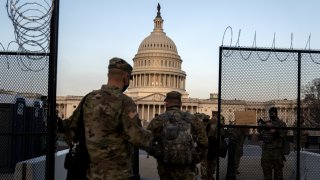
- The House passed a $1.9 billion supplemental security funding bill in response to the Jan. 6 insurrection at the U.S. Capitol.
- It faces an uncertain path in the Senate, as Republicans question the need for additional legislation to respond to the attack on the Capitol.
- Passage of the bill follows House approval of a measure that would set up an independent commission to investigate what led to the insurrection.
The House passed a $1.9 billion U.S. Capitol security bill Thursday as Congress splinters over how to protect lives and the democratic process after the Jan. 6 insurrection.
The Democratic-held chamber approved the measure by the thinnest of margins a day after it passed a bill to set up an independent commission to investigate the attack on the legislature. Opposition from Republican leaders has raised doubts about whether either proposal can get through the evenly split Senate.
The House cleared the security funding in a 213-212 vote, while three representatives voted "present."
Get a weekly recap of the latest San Francisco Bay Area housing news. Sign up for NBC Bay Area’s Housing Deconstructed newsletter.
The three Democrats who opposed the bill and those who voted "present" are part of the party's progressive wing. Every Republican voted against the security money, a day after 35 GOP representatives backed the bipartisan deal to set up the commission to investigate the insurrection.
The House plans to leave Washington for three weeks, with its next votes expected the week of June 14.
The bill passed Thursday would pay back the National Guard and Washington, D.C., for costs incurred securing the Capitol this year, and provide the Capitol Police with overtime pay, retention bonuses and trauma resources. It also would create a response force that would aid the Capitol Police in emergencies, boost security for members of Congress and fortify doors and windows in the Capitol.
Money Report
Democrats moved to pass both pieces of legislation this week. They say it is vital to better understand how a mob of Trump supporters overran the Capitol and disrupted the count of President Joe Biden's electoral win — and to prevent it from happening again. House Republican leaders, who have tried to divert attention from the attack and curb criticism of former President Donald Trump's election conspiracy theories that helped to fuel it, pushed against passage of both bills.
Senate Majority Leader Chuck Schumer, D-N.Y., has vowed to bring at least the commission plan to a Senate vote. He could face a difficult time winning over the 10 Republicans needed to get it or the supplemental funding through the chamber.
Senate Minority Leader Mitch McConnell, R-Ky., said Wednesday he would oppose the commission to investigate the attack, contending it could duplicate congressional and federal law enforcement probes. While he did not explicitly say he would vote against the security funding, he signaled Tuesday that he was reluctant to back the current bill.
"We're not sure what to spend the money on yet. So I think we are pushing the pause button here," he said.
It is also unclear whether Democrats could keep all 50 members of their caucus on board in the Senate. Rep. Jamaal Bowman, a New York Democrat who voted "present" on the funding bill Thursday, said he does not think more money for the Capitol Police solves what he said caused the attack: "a lack of coordination, preparation, and sharing of intelligence," along with festering white supremacy.
"We need to reimagine public safety entirely and investigate those who were complicit in this attack. Pouring billions more into policing does not accomplish that goal," he said in a statement.
Rioters overwhelmed Capitol Police, broke through barricades, smashed windows and overran the Capitol as lawmakers counted electoral votes on Jan. 6. The mob came within moments of reaching top government officials. The attack disrupted the affirmation of Biden's victory for hours.
It took roughly three hours for the Pentagon to approve a National Guard response to retake the Capitol. The guard has kept a presence around the legislature since Jan. 6.
Some Republicans expressed concerns about the bill's provision setting up an emergency response force within the D.C. National Guard. House and Senate Armed Services Committee ranking members Rep. Mike Rogers, R-Ala., and James Inhofe, R-Okla., said in a statement Wednesday that "we cannot and should not militarize the security of the Capitol Complex."
Lawmakers from both parties have also expressed concerns about making the Capitol grounds permanently look like a militarized zone.






